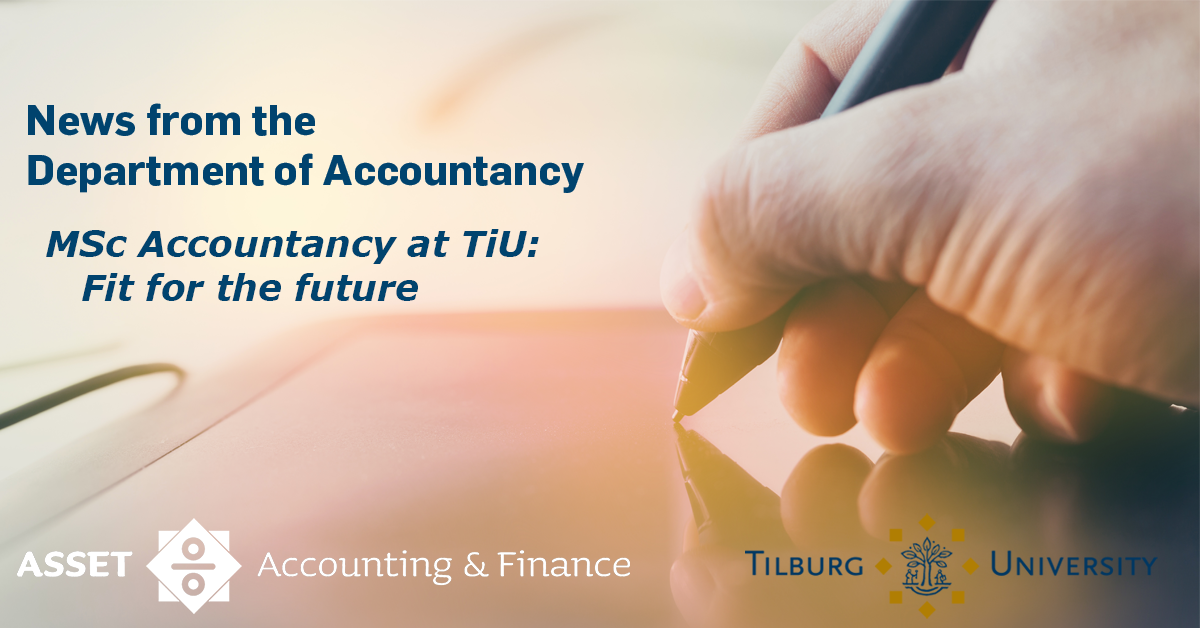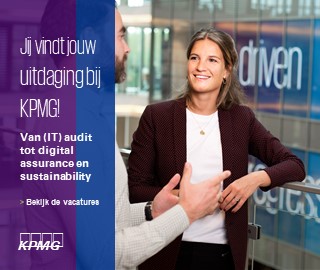Technological developments push the economy, and thus also the accountancy profession, at lightning speed. To educate the future accountancy professionals, we updated the Master Accountancy at Tilburg University. It is my pleasure to inform you about the highlights of our updated program that was launched in September 2019.
The courses in our curriculum focus on topics that are tailored towards the needs of future accountancy professionals. The Accounting Information Systems course, for example, is updated into a course where data analytics is one of the core topics. Also in the course Advanced Auditing ‘big data’ gains importance. Moreover, the new module on IT auditing gives extra value to Advanced Auditing. Another topic that enters our program is ‘integrated reporting’. The fact that non-financial information is crucial in different types of business decisions let us decide that a course on ‘Integrated Reporting and Behavior’ is indispensable in our program. Besides these examples of how courses were updated to better align with the accountancy profession, we further try to reflect reality by promoting integration between courses. As auditors, for example, need to understand why a system is created in a specific way, how a financial number is calculated, as well as why managers made a particular decision, we are developing cases and workshops that discuss topics from different points of view. In that way, we train students to understand the links between different subfields in accountancy (financial accounting, management accounting, auditing, systems etc.) which is necessary to develop a critical attitude about the way how information is used in decision making processes in business.
As accountancy is about collecting, processing and using information, we can label accountancy as a business information discipline. Given this focus on information, quite some disciplines are linked to the use of this information, and thus to accountancy. Strategic management as well as finance, for example, have quite some overlap with accountancy. Therefore, our program offers specialization opportunities to let students prepare for various career paths. Students pursuing a career in auditing, for example, can select the courses ‘Advanced Auditing’ and ‘Advanced Financial Accounting’ as electives. The electives ‘Corporate Entrepreneurship’ and ‘Corporate Governance and Restructuring’ are available for students that are more interested in the management side of accountancy. Also some finance courses are listed as electives in our program for students that want to specialize in that direction. We plan to add more elective courses in near future. A course on taxation is certainly on our short list.
“Moreover, the MSc File Accountancy lets students reflect on their work at different phases in the process which allows students to further develop their character that enables then to become an ambitious accountancy professional.”
In all courses, we combine theory with insights from practice. The use of real life cases and having professional experts teaching in our program illustrate how we provide recent and relevant knowledge to our students. However, besides knowledge, also professional skills gain importance for starters on the job market. Workshops on the use of particular data analyzing software is only one example of how skills training is added in the courses. Moreover, we offer professional skills training on topics such as negotiation and communication skills. Companies really welcome this initiative and provide support to develop this further.
Completing a Master Accountancy implies that you gained specific knowledge in the different accountancy subfields (such as financial accounting, management accounting, auditing, and governance) and understand ‘the language of business’ from different perspectives. We developed the MSc File Accountancy (the successor of the Master Thesis) which gives students the opportunity to show that they are able to apply their knowledge from the different accountancy subfields. This final individual assignment is split in three reports. The Business Application, the first report in the MSc File Accountancy, focuses on an application of academic research to a real-life company problem selected by the student. The second report is a Replication Study where the focus is on data analysis. The third report, the Research Note, is an individual research study with a clear contribution to practice and academia. In this Research Note, students use the feedback obtained on the earlier reports to improve their knowledge and skills. The importance of feedback and the repetition of assignments in a different setting are important characteristics of the MSc File Accountancy to achieve the predetermined goals. Note that the learning objectives of this MSc File Accountancy are exactly the same as the learning goals that were formulated for the Master Thesis. We believe that this different set-up enables students to meet the learning objectives better. Moreover, the MSc File Accountancy lets students reflect on their work at different phases in the process which allows students to further develop their character that enables then to become an ambitious accountancy professional. Also the defense of the work in an honest but convincing way is a very useful experience for future accountancy professionals. As the MSc File Accountancy focuses on knowledge, skills and character, the three pillars of the Tilburg Education Profile (TEP), this final assessment of the MSc Accountancy further prepares our students to become critical thinkers that actively contribute to society.
I hope that these highlights provide you sufficient insights in how the Master Accountancy at Tilburg University is an attractive academic program clearly linked with business. We are ready to educate the future accountancy professionals!
Note: More details are available on our program website (https://www.tilburguniversity.edu/education/masters-programmes/accountancy).

















